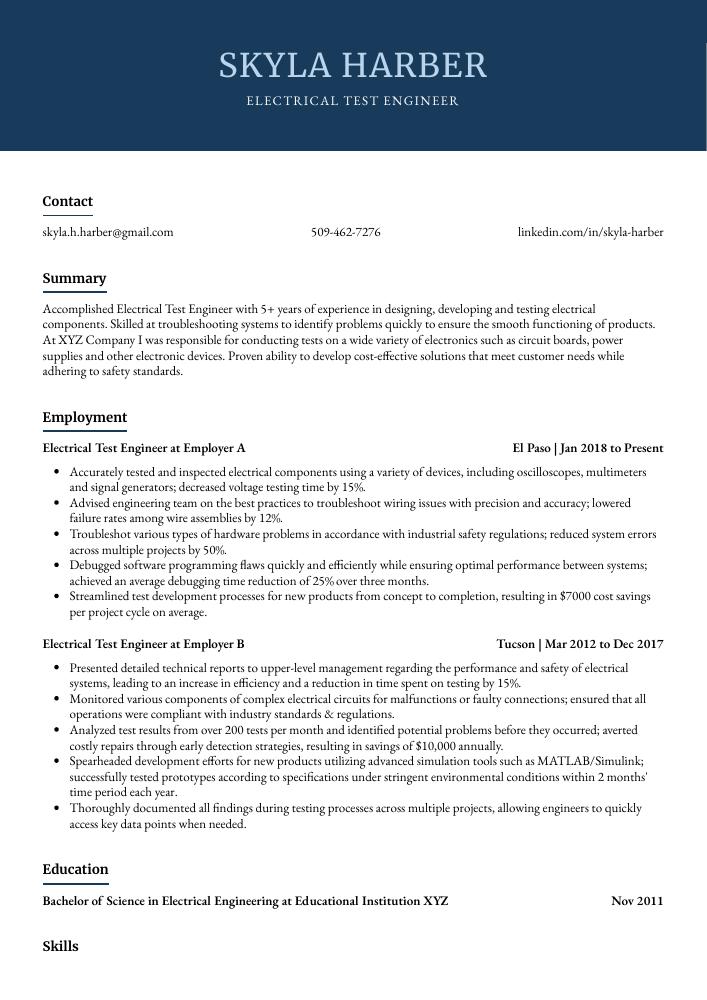Electrical Test Engineer Resume Guide
Electrical Test Engineers design, develop and maintain electrical control systems and components to ensure they are compliant with safety regulations. They use various testing methods such as simulation software, laboratory tests and on-site inspections to evaluate the performance of a system or component in order to identify any issues that may arise.
Your electrical engineering and testing experience make you the perfect fit for any company looking to hire an engineer. But potential employers don’t know about your credentials yet, so create a resume that will leave them in awe of your abilities.
This guide will walk you through the entire process of creating a top-notch resume. We first show you a complete example and then break down what each resume section should look like.
Table of Contents
The guide is divided into sections for your convenience. You can read it from beginning to end or use the table of contents below to jump to a specific part.
Electrical Test Engineer Resume Sample
Skyla Harber
Electrical Test Engineer
[email protected]
509-462-7276
linkedin.com/in/skyla-harber
Summary
Accomplished Electrical Test Engineer with 5+ years of experience in designing, developing and testing electrical components. Skilled at troubleshooting systems to identify problems quickly to ensure the smooth functioning of products. At XYZ Company I was responsible for conducting tests on a wide variety of electronics such as circuit boards, power supplies and other electronic devices. Proven ability to develop cost-effective solutions that meet customer needs while adhering to safety standards.
Experience
Electrical Test Engineer, Employer A
El Paso, Jan 2018 – Present
- Accurately tested and inspected electrical components using a variety of devices, including oscilloscopes, multimeters and signal generators; decreased voltage testing time by 15%.
- Advised engineering team on the best practices to troubleshoot wiring issues with precision and accuracy; lowered failure rates among wire assemblies by 12%.
- Troubleshot various types of hardware problems in accordance with industrial safety regulations; reduced system errors across multiple projects by 50%.
- Debugged software programming flaws quickly and efficiently while ensuring optimal performance between systems; achieved an average debugging time reduction of 25% over three months.
- Streamlined test development processes for new products from concept to completion, resulting in $7000 cost savings per project cycle on average.
Electrical Test Engineer, Employer B
Tucson, Mar 2012 – Dec 2017
- Presented detailed technical reports to upper-level management regarding the performance and safety of electrical systems, leading to an increase in efficiency and a reduction in time spent on testing by 15%.
- Monitored various components of complex electrical circuits for malfunctions or faulty connections; ensured that all operations were compliant with industry standards & regulations.
- Analyzed test results from over 200 tests per month and identified potential problems before they occurred; averted costly repairs through early detection strategies, resulting in savings of $10,000 annually.
- Spearheaded development efforts for new products utilizing advanced simulation tools such as MATLAB/Simulink; successfully tested prototypes according to specifications under stringent environmental conditions within 2 months’ time period each year.
- Thoroughly documented all findings during testing processes across multiple projects, allowing engineers to quickly access key data points when needed.
Skills
- Circuit Design
- Electrical Safety Testing
- Troubleshooting
- Automated Testing
- Data Analysis
- Soldering
- Electrical Schematics
- Calibration
- Power Systems
Education
Bachelor of Science in Electrical Engineering
Educational Institution XYZ
Nov 2011
Certifications
Certified Electrical Test Technician
International Certification Accreditation Council (ICAC
May 2017
1. Summary / Objective
Your resume summary or objective should be a concise overview of your qualifications as an electrical test engineer. For example, you could mention the various types of testing equipment and processes you have experience with, any certifications or awards that demonstrate your expertise in this field, and how you successfully implemented new safety protocols at your current company.
Below are some resume summary examples:
Skilled electrical test engineer with 8+ years of experience in designing, developing, and testing electrical products for the consumer electronics market. Proven track record of creating innovative solutions to improve product safety and performance. Experienced working with high-voltage systems, PCBs, analog/digital components, embedded programming languages (C++/Java), and IoT devices. At XYZ Inc., reduced time spent on manual tests by 25% while increasing accuracy by 40%.
Determined Electrical Test Engineer with 8+ years of experience in designing, developing, and implementing test strategies for electronics to ensure product reliability. At XYZ Company, conducted high-voltage tests on electrical products and developed a custom calibration system that increased accuracy by 20%. Received the “Employee of the Year” award for exceptional performance in testing new products before launch.
Seasoned electrical test engineer with 10+ years of experience in designing and implementing tests to ensure the quality, performance, and reliability of products. Proven track record of successfully troubleshooting complex electrical systems while meeting strict deadlines. Looking to join ABC Electronics as a senior electrical test engineer where I can use my expertise to develop innovative solutions for customers.
Well-rounded electrical test engineer with 7+ years of experience designing and developing automated testing systems. Seeking to leverage knowledge of electronics, embedded software, and debugging tools in a lead role at ABC Tech. At XYZ Corporation, improved test cycle times by 45% while reducing costs by 20%. Instrumental in improving product quality metrics via comprehensive root cause analysis techniques.
Dependable and experienced electrical test engineer with 8+ years of experience in developing and executing rigorous testing procedures for a variety of electronic products. Experienced in troubleshooting design issues, creating test plans, writing technical reports, and providing support on product launches. At XYZ Company achieved an 80% accuracy rate while completing 605 tests within three months.
Proficient electrical test engineer with 6+ years of experience in troubleshooting and testing electrical systems. Skilled in designing, building, and maintaining electronic circuit boards to meet product specifications. Proven success in improving efficiency by 20% while reducing costs by up to 15%. Seeking a position at ABC Tech where I can utilize my skillset for the benefit of the company.
Professional electrical test engineer with 8+ years of experience in the development, design, and implementation of electrical testing systems. Proven track record in troubleshooting complex issues and consistently delivering projects on time and within budget. Seeking to join ABC Tech as an Electrical Test Engineer to help ensure reliability across their diverse product range.
Hard-working electrical test engineer with 5+ years of experience in the industry. Skilled in troubleshooting and resolving hardware issues, designing testing strategies for new products, and overseeing quality assurance teams to ensure product safety standards are met. Aiming to bring my expertise to ABC Technologies as a Test Engineer.
2. Experience / Employment
In the experience/employment/work history section, you should list your roles in reverse chronological order. This means that the most recent role is listed first.
When talking about what you did, use bullet points to make it easier for the reader to digest the information quickly and easily. You want to be sure to include details on what tasks were completed and any quantifiable results achieved during each job.
For example, instead of saying “Performed electrical tests,” you could say, “Conducted rigorous testing on a variety of electronic components using specialized equipment; identified 10+ defects per day resulting in improved product quality.”
To write effective bullet points, begin with a strong verb or adverb. Industry specific verbs to use are:
- Designed
- Programmed
- Installed
- Calibrated
- Troubleshot
- Monitored
- Tested
- Debugged
- Analyzed
- Documented
- Inspected
- Operated
- Commissioned
- Upgraded
Other general verbs you can use are:
- Achieved
- Advised
- Assessed
- Compiled
- Coordinated
- Demonstrated
- Developed
- Expedited
- Facilitated
- Formulated
- Improved
- Introduced
- Mentored
- Optimized
- Participated
- Prepared
- Presented
- Reduced
- Reorganized
- Represented
- Revised
- Spearheaded
- Streamlined
- Structured
- Utilized
Below are some example bullet points:
- Inspected and tested electrical systems and components of various machinery, ensuring that all safety regulations were met; improved overall quality assurance by 25%.
- Improved the accuracy of test results by programming automated testing machines to measure voltage, current and resistance against specified parameters.
- Expedited project completion times from three months to one month on average through efficient organization and management of time-critical tasks.
- Programmed PLCs (Programmable Logic Controllers) for factory automation processes while adhering strictly to industry standards such as IEC 61508/61511 & ISO 26262 guidelines.
- Meticulously documented all test data in reports using software applications like LabView & TestStand; these records facilitated easier analysis and troubleshooting procedures when needed later on down the line.
- Operated a variety of electrical testing equipment and instruments to inspect, troubleshoot and resolve faulty systems; completed over 200 tests per month with a 98% success rate.
- Calibrated complex circuit boards for voltage, current and resistance accuracy, achieving an average precision rating of 0.5%.
- Designed innovative test protocols to effectively evaluate the quality of electronic components during production processes; saved $7000 in costs every year due to fewer defective parts produced as a result.
- Introduced modern simulation tools such as PSpice & LabVIEW into existing manufacturing frameworks while maintaining design standards compliance throughout each stage of development process; improved productivity by 25%.
- Reliably conducted environmental testing on new products in order to ensure their durability under extreme weather conditions prior to market release; reduced warranty claims by 45% within first 6 months after launch date.
- Independently designed and implemented electrical test plans to evaluate products, resulting in a 15% decrease of engineering defects.
- Reduced operational cost by $20,000 through the optimization of automated testing processes and equipment utilization.
- Formulated comprehensive reports detailing key performance metrics including safety compliance standards for clients across various industries.
- Compiled technical data from manufacturing tests for further analysis; identified weaknesses within existing procedures to improve product durability and reliability by 28%.
- Demonstrated strong attention-to-detail when conducting quality assurance checks on all electrical components prior to distribution; verified that products met rigorous industry requirements with 100% accuracy rate.
- Prepared and validated comprehensive documentation for electrical systems, which included operation manuals and safety protocols; saved the company over $5,000 in technical writing costs.
- Tested a variety of electrical components such as motors and control panels to ensure proper functioning before installation; reduced project delays by 40%.
- Commissioned a wide range of high-voltage installations, including solar power plants & wind turbines with up to 1MW capacity each; completed projects within budget 10 times out of 12.
- Installed interconnected wiring in homes and businesses throughout the region according to National Electrical Code standards while adhering strictly to safety regulations at all times; no accidents or major incidents reported on any project site under my supervision.
- Consistently exceeded customer expectations through efficient problem solving skills, resulting in an average satisfaction rating above 95% across two years of service delivery.
- Coordinated the testing of both hardware and software components for over 25 electrical units, ensuring that all quality standards were met before their release.
- Assessed the performance of existing products and identified areas where they could be improved; increased overall efficiency by 10% through system upgrades.
- Actively collaborated with engineering teams to develop new product designs from concept stage to completion; contributed to a total savings of $25,000 on materials costs in the last year alone.
- Upgraded specialized test equipment used during evaluation processes, resulting in higher accuracy levels (99%) when evaluating mechanical systems’ functionality and durability features within given timelines (+20%).
- Reorganized workflow procedures across multiple departments related to electrical testing projects, improving team collaboration efforts by 15%.
- Utilized electrical testing equipment to inspect and evaluate design performance, successfully identifying defects in over 200 electrical systems with 0% errors.
- Structured and implemented rigorous testing protocols for new hardware designs that reduced overall cost by 25%.
- Confidently conducted troubleshooting activities on both software and hardware issues; decreased downtime of malfunctioning products from 8 hours to 2 hours on average.
- Revised existing test plans for efficient execution, introducing automation techniques that improved quality assurance processes by 40%.
- Documented all findings during the inspection process, ensuring accuracy when outlining potential risks or areas of improvement to stakeholders/management team members.
- Participated in the testing of electrical components on a variety of projects, successfully completing over 400 tests in the past 6 months with zero errors.
- Mentored a team of 3 junior engineers to ensure they met all safety and quality requirements while carrying out their duties; reduced time spent retesting by 15%.
- Optimized existing test protocols for greater efficiency, resulting in an average 10% increase in productivity across all departments using these procedures.
- Represented company at client meetings and technical conferences as part of product demonstrations; increased customer satisfaction ratings by 20%.
- Efficiently troubleshooted any issues that arose during testing processes with minimal disruption to production schedules, saving $10K+ per month in labor costs.
- Successfully tested and validated over 50 electrical components for various products, reducing malfunction rate by 25%.
- Achieved a 98% accuracy rating in conducting performance tests on all new designs within tight deadlines.
- Facilitated the design of automated testing programs to improve efficiency and reduce manual labor hours by 40%.
- Developed comprehensive reports to present detailed test results with recommendations on optimization strategies that increased product quality by 15%.
3. Skills
Even though two organizations are hiring for the same role, the skillset they want an ideal candidate to possess could differ significantly. For instance, one may be on the lookout for an individual with experience in designing and developing test plans, while the other may be looking for someone who is proficient with circuit board troubleshooting.
Therefore, it is important to tailor your skills section according to each job you are applying for. This will help ensure that applicant tracking systems recognize your resume as a good fit and pass it on to human recruiters.
In addition to listing relevant skills here, you should also discuss them further in other sections such as summary or work experience.
Below is a list of common skills & terms:
- Automated Testing
- Calibration
- Circuit Design
- Data Analysis
- Electrical Safety Testing
- Electrical Schematics
- Power Systems
- Robotics Engineering
- Soldering
- Troubleshooting
4. Education
Including an education section on your resume will depend on how far into your career you are. If you just graduated and have no work experience, mention your education below the resume objective. However, if you have been working as an electrical test engineer for years with plenty of responsibilities to showcase, omitting the education section is perfectly fine.
If including an education section is necessary, try to list courses and subjects related to the electrical engineering role that you are applying for.
Bachelor of Science in Electrical Engineering
Educational Institution XYZ
Nov 2011
5. Certifications
Certifications demonstrate to a potential employer that you have the knowledge and skills required for the job. They also show that you are committed to your professional development, as certifications require time and effort in order to obtain them.
If you have any relevant certifications, make sure they are included on your resume so employers can see what qualifications you possess. This will help give them an idea of how well-suited you are for the position.
Certified Electrical Test Technician
International Certification Accreditation Council (ICAC
May 2017
6. Contact Info
Your name should be the first thing a reader sees when viewing your resume, so ensure its positioning is prominent. Your phone number should be written in the most commonly used format in your country/city/state, and your email address should be professional.
You can also choose to include a link to your LinkedIn profile, personal website, or other online platforms relevant to your industry.
Finally, name your resume file appropriately to help hiring managers; for Skyla Harber, this would be Skyla-Harber-resume.pdf or Skyla-Harber-resume.docx.
7. Cover Letter
Including a cover letter with your job application is a great way to make a good first impression. This document should be made up of 2 to 4 paragraphs and provide more detail about who you are, why you’re applying for the role and what makes you an ideal candidate.
Cover letters aren’t always necessary but they can help highlight your skills, experience, qualifications and accomplishments in ways that may not be apparent from just reading through a resume. Writing one could give recruiters better insights into who you are as an individual so it’s definitely worth considering if possible.
Below is an example cover letter:
Dear Verner,
I am interested in applying for the electrical test engineer position at your company. I am a recent graduate of XYZ University with a degree in electrical engineering and have experience working as an intern in the testing department at ABC Corporation.
During my internship, I was responsible for conducting various tests on electrical components to ensure they met quality standards. I also created detailed reports documenting my findings and made recommendations for improvements when necessary. My supervisors were impressed with my work and told me that I have a natural ability for this type of work.
I am confident that I can be an asset to your team and would like to use my skills and knowledge to help contribute to the success of your company. Please find attached a copy of my resume for your review, and do not hesitate to contact me if you have any questions or require any additional information.
Thank you for your time and consideration, and I look forward to hearing from you soon.
Sincerely,
Skyla
Electrical Test Engineer Resume Templates
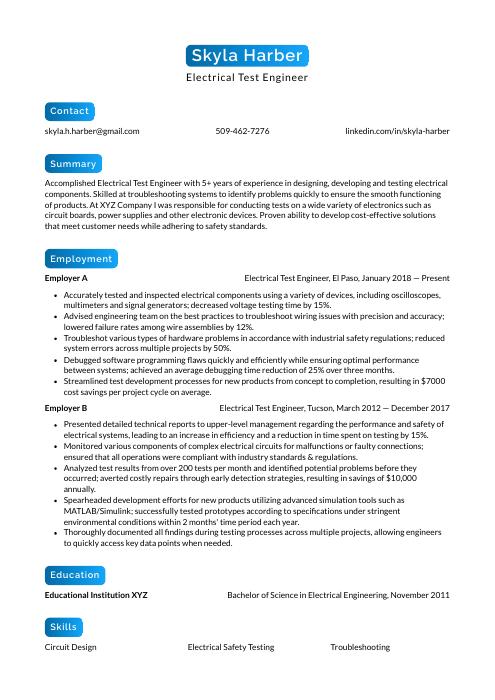 Kinkajou
Kinkajou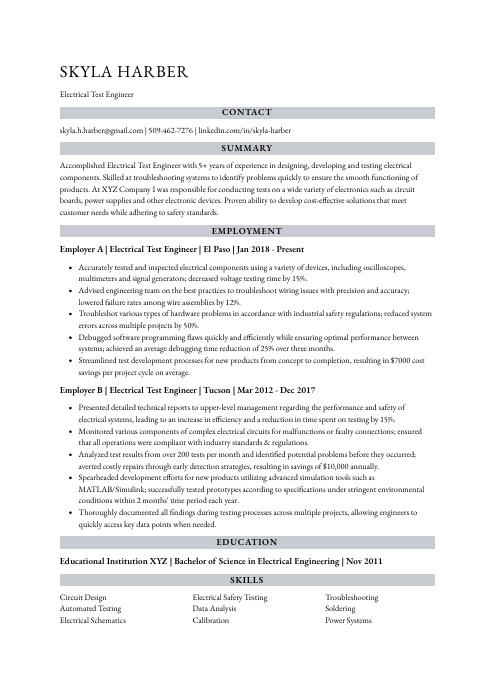 Numbat
Numbat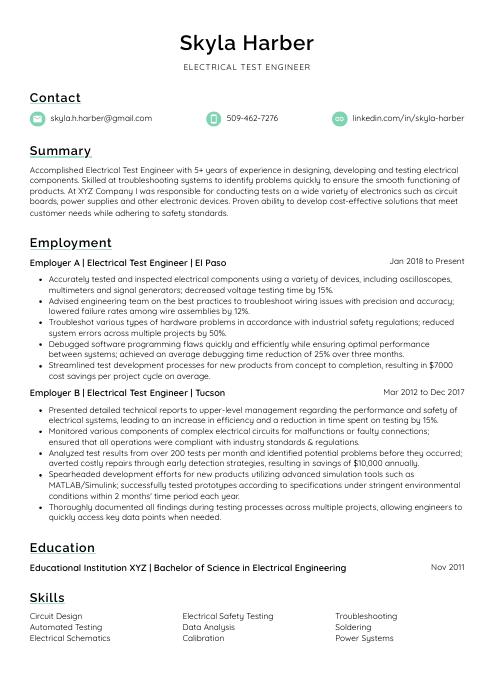 Lorikeet
Lorikeet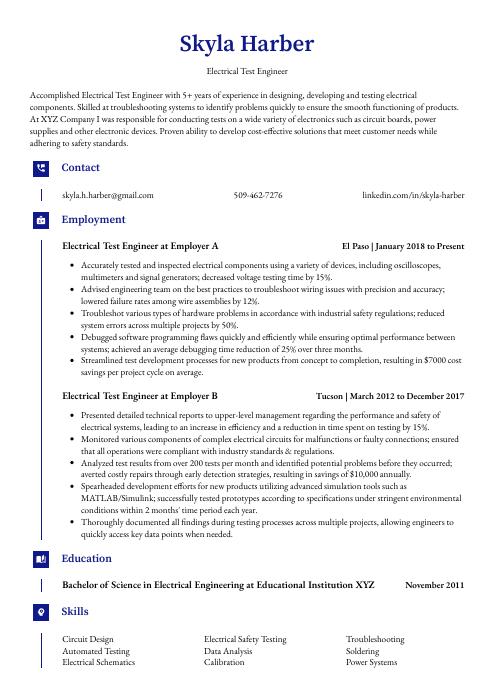 Gharial
Gharial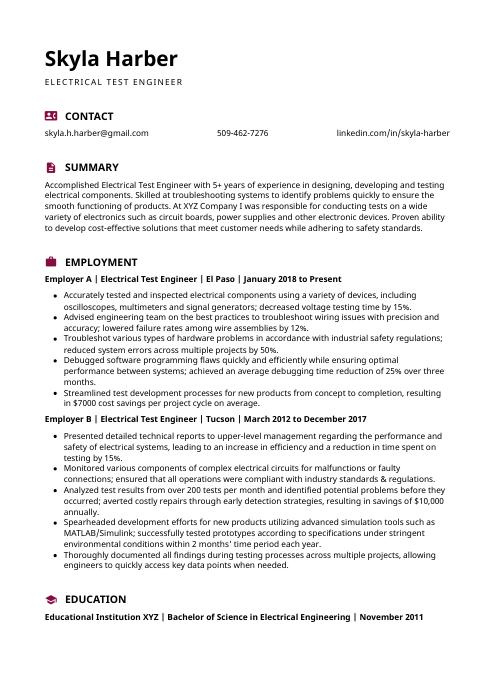 Hoopoe
Hoopoe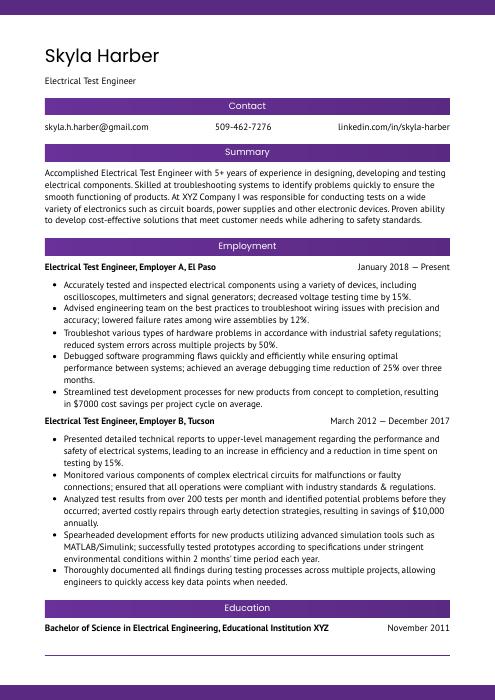 Jerboa
Jerboa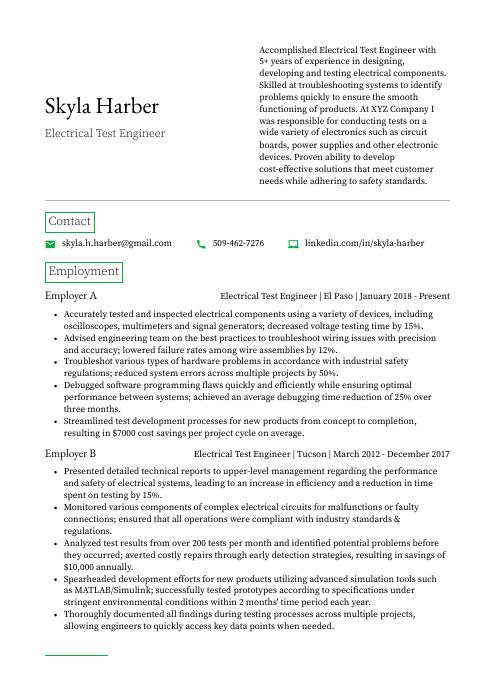 Quokka
Quokka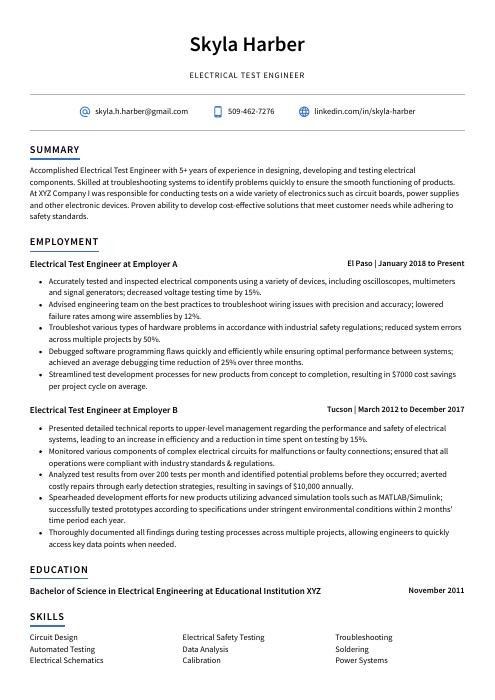 Axolotl
Axolotl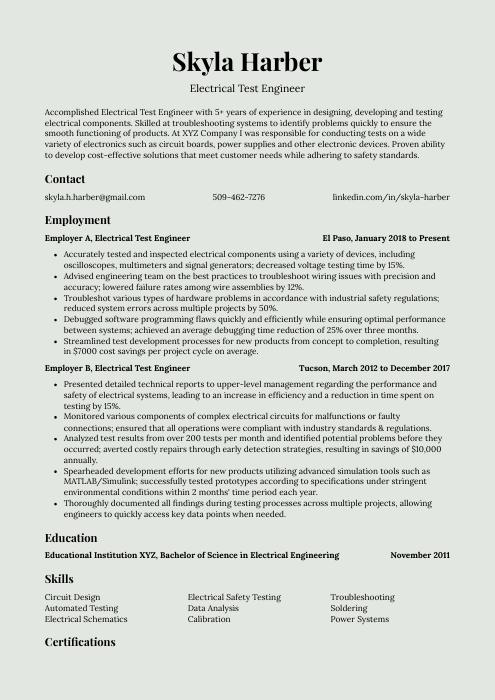 Saola
Saola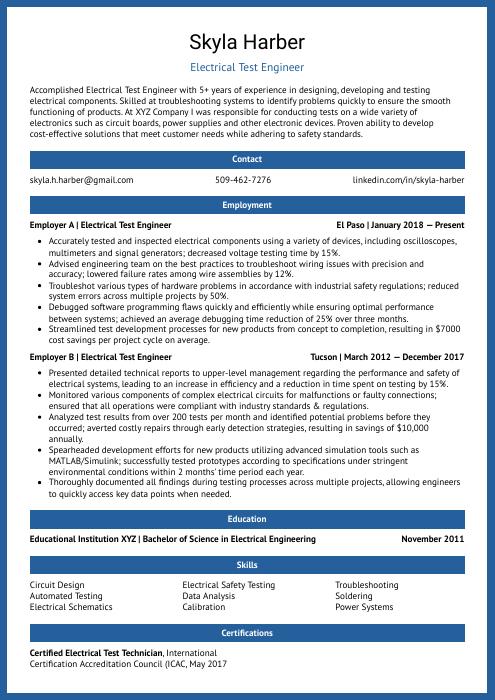 Ocelot
Ocelot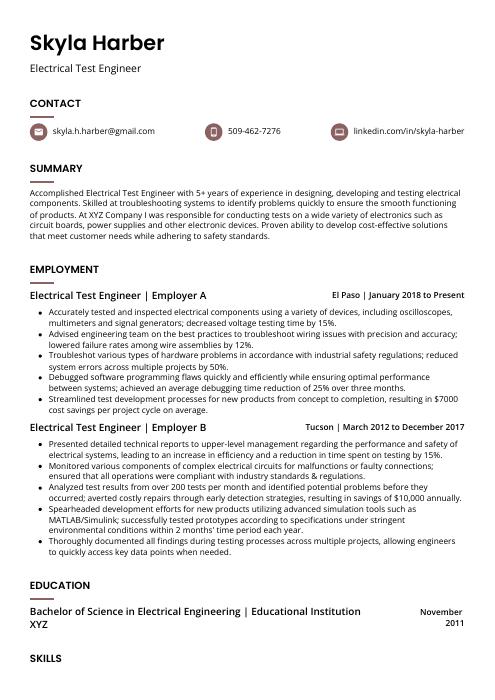 Fossa
Fossa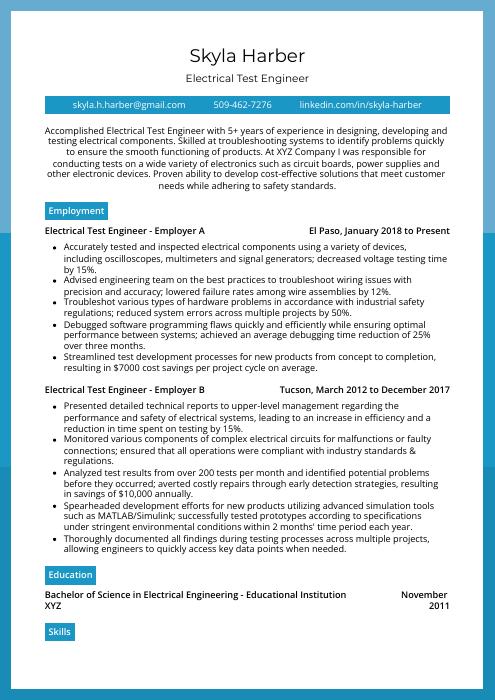 Rhea
Rhea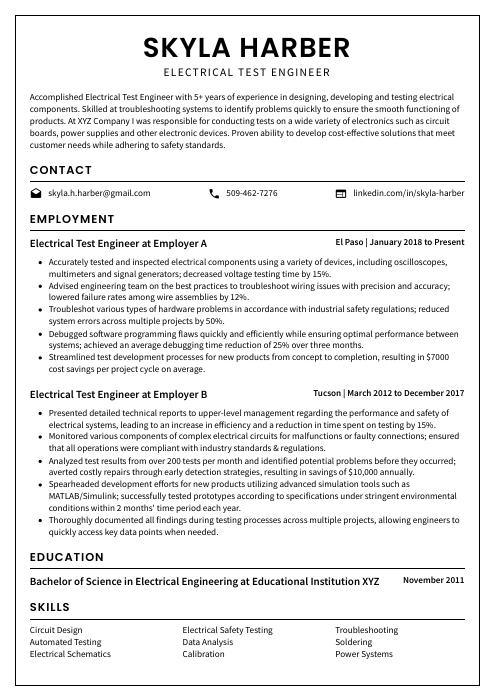 Cormorant
Cormorant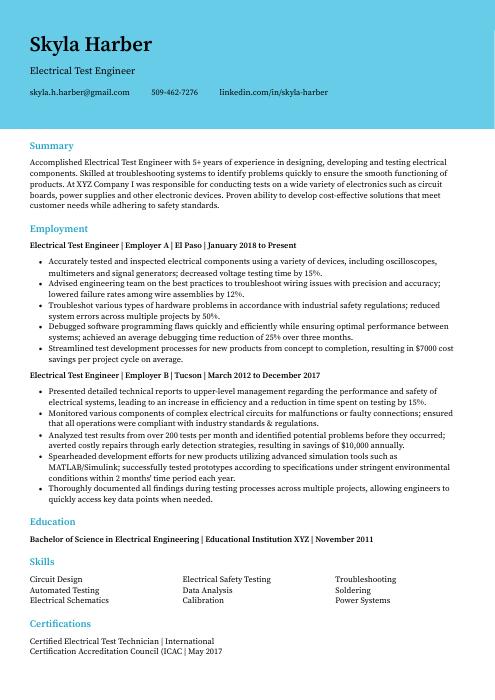 Dugong
Dugong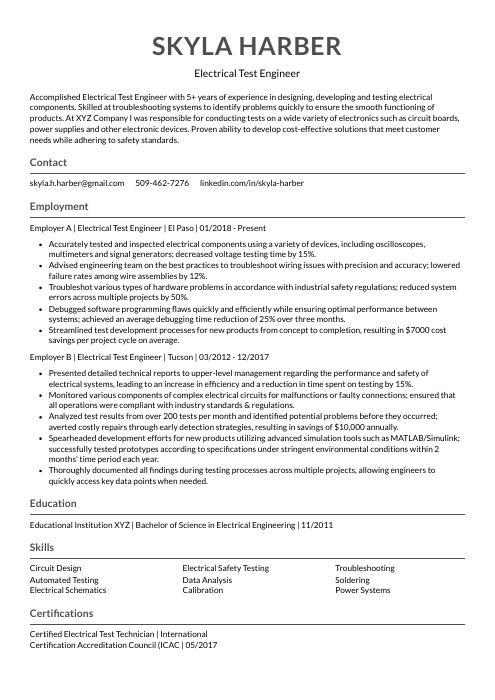 Indri
Indri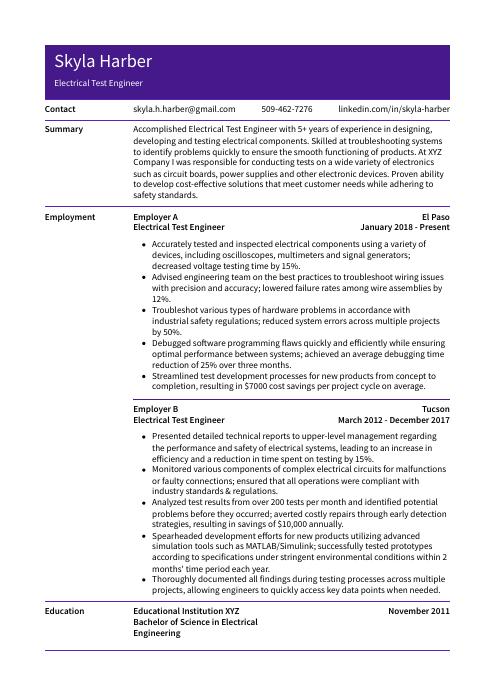 Pika
Pika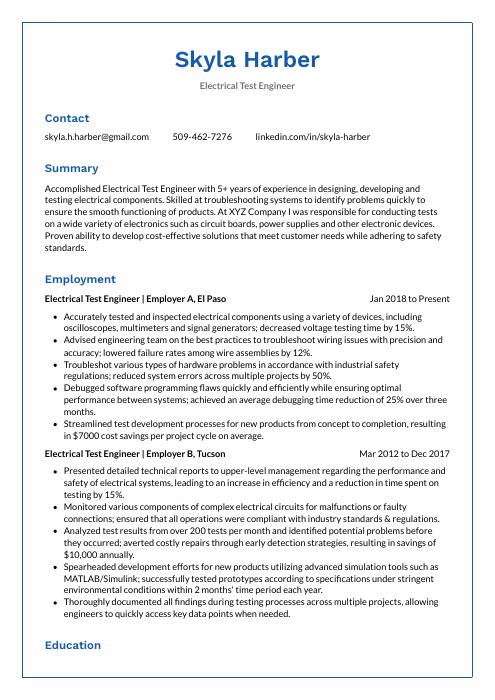 Markhor
Markhor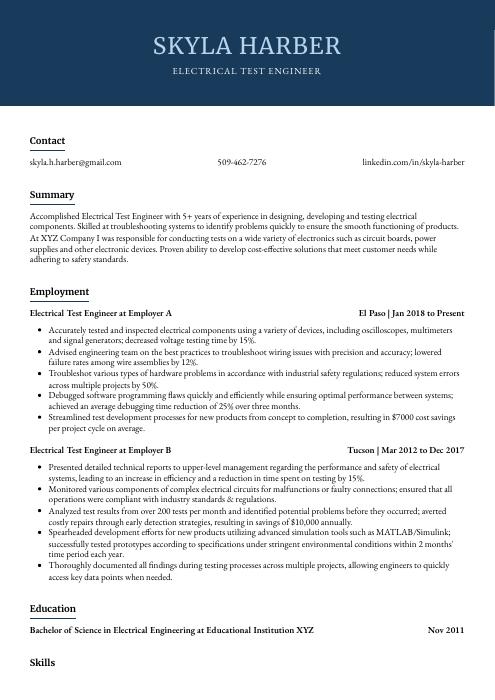 Bonobo
Bonobo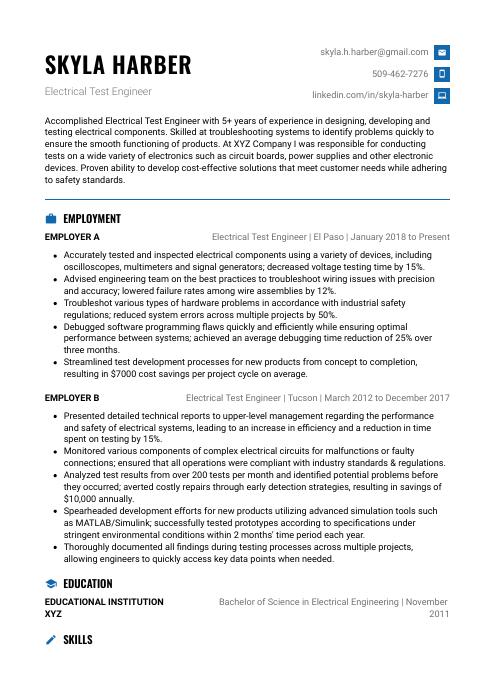 Echidna
Echidna Rezjumei
Rezjumei
